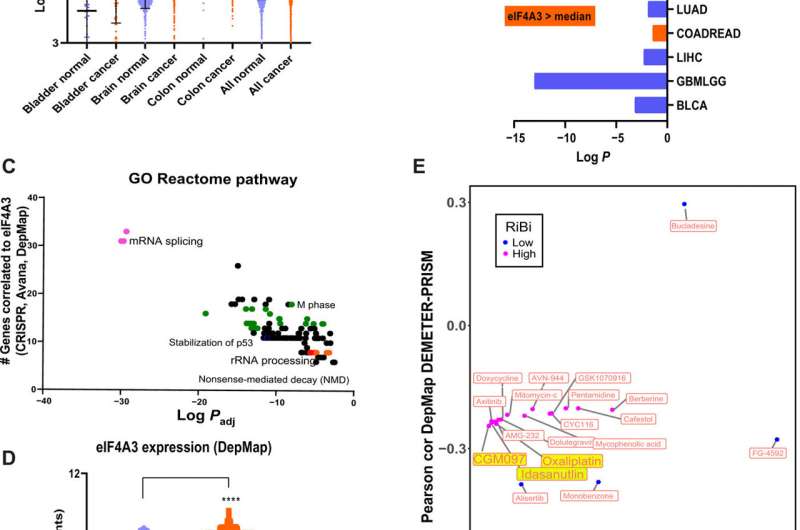
For a cell to grow and divide, it needs to produce new proteins. This also applies to cancer cells. In a new study published in Science Advances, researchers at Karolinska Institutet have investigated the protein eIF4A3 and its role in the growth of cancer cells. The study shows that by blocking or reducing the production of this protein, other processes arise that cause the growth and cell division of cancer cells to cease and eventually die.
The body’s normal cell division is carefully controlled, where genes in the cell regulate when it is time to start and stop cell division.
Sometimes this balance is disturbed and the cell continues to divide uninhibitedly. After some time, a small collection of cells develops—cancer may be about to form.
“When a cell grows, new proteins are produced, among other things, through the translation of the cell’s DNA information into mRNA, which forms the basis for the creation of proteins. The cell also needs to manufacture rRNA for the cell’s small factories, the ribosomes, which are responsible for producing proteins,” says associate professor Mikael Lindström, co-author and part of professor Jiri Bartek’s research group at the Department of Medical Biochemistry and Biophysics, Karolinska Institutet, who conducted the study.
In the study, the research group investigated cultured cancer cells and cancer tissue where the eIF4A3 protein’s expression was high compared to normal tissue.
By adding synthetically produced small molecules that can later be further developed into finished drugs, the production of eIF4A3 can be checked. The researchers then discovered two distinct changes in the cancer cells.
“Firstly, we saw that the blocking of eIF4A3 activated the protein p53, a protein that has an important role to play in fighting cancer cells,” says Dimitris Kanellis, postdoctoral fellow at the Department of Medical Biochemistry and Biophysics, and the first author of the study.
Proteins counteract each other
However, one challenge with many types of tumors is that the positive functions of the p53 protein are counteracted by another protein, MDM2.
“Interestingly, we noted that the blocking eIF4A3 also meant that the MDM2 protein changed. This change helps to maintain and strengthen p53 and can be beneficial when we want to inhibit the growth of cancer cells,” continues Dimitris Kanellis.
The main conclusions of the study indicate that depletion or inhibition of eIF4A3 activates p53, alters the manufacturing process of proteins by disrupting ribosome biogenesis, and thereby inhibits the growth of cancer cells.
New opportunities for cancer patients
Knowledge of the importance of the eIF4A3 protein opens up new opportunities for better and more effective treatment of cancer patients.
“The discovery is very relevant as this type of targeted treatment may represent a new possible approach in chemotherapy, for example in colon cancer where cancer cells often have a high level of ribosomes and rapid growth. Another example is a sarcoma, cancer of the body’s support tissues, where we know that sometimes there is an overproduction of MDM2. This increases the chances of more effective treatment,” says Mikael Lindström and professor Jiri Bartek, corresponding authors in the study.
These findings provide an important foundation for further studies. However, since the study has mainly been carried out in cultured cancer cells and clinical tumor material, it remains to be seen how the blocking of eIF4A3 will affect the growth of cancer in vivo.
Source: Read Full Article
